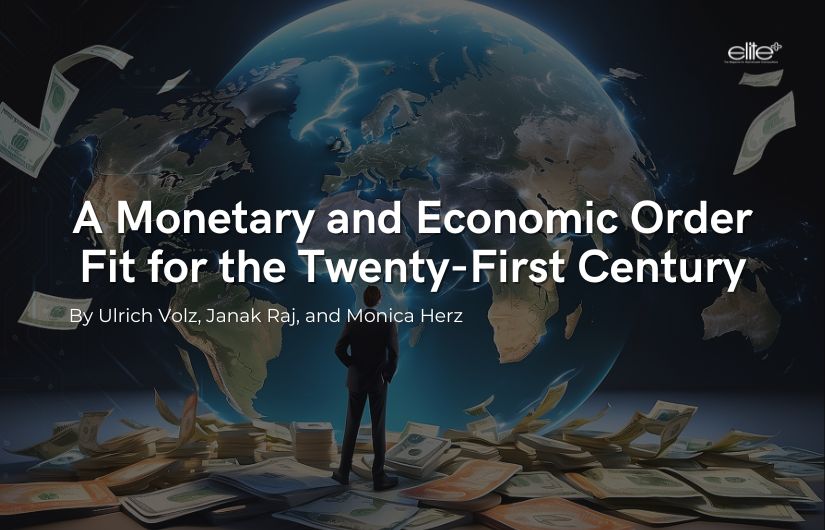By Ulrich Volz, Janak Raj, and Monica Herz
LONDON – Eighty years ago, delegates from 44 countries gathered in Bretton Woods, New Hampshire, to coordinate reconstruction in the aftermath of World War II and promote international economic cooperation. The institutions for which they laid the groundwork – the International Monetary Fund and the World Bank – stand at the heart of the global monetary and financial order.
In recent years, however, climate change and the COVID-19 pandemic have laid bare just how out of step these institutions are with changing global economic realities and development priorities. If the international community is to have a chance of addressing twenty-first-century challenges effectively and equitably, the global economic and financial architecture must be reformed. Eight priorities stand out.
First, developing economies must be given greater voice in multilateral institutions. As has been widely recognized, global economic power has shifted significantly since 1944, with emerging markets and developing economies carrying far more weight. Quotas and voting systems at the Bretton Woods institutions, however, are still skewed heavily in favor of the advanced economies. Moreover, a “gentlemen’s agreement” whereby a European leads the IMF and an American leads the World Bank persists.
This state of affairs not only undermines the Bretton Woods institutions’ legitimacy; it also impedes their ability to meet the urgent and complex challenges of our time. That is why quotas and voting shares must be reallocated – a change that the advanced economies, especially the United States, have so far resisted – and a “double-majority” leadership-selection procedure should be adopted. In such a system, successful candidates would have to obtain both a majority of weighted votes (which reflect countries’ shares in the institution) and the support of a majority of member countries.
Second, the Global Financial Safety Net (GFSN) – the network of institutions that provide critical financing in times of crisis – must be strengthened and made more responsive to the needs of developing economies facing evolving climate and macroeconomic risks. As it stands, the GFSN not only falls far short in terms of the amount of support it provides, it also suffers from built-in structural inequalities that leave developing countries more exposed. A bigger, more equitable GFSN would better safeguard countries against climate shocks and other crises, freeing up resources to foster development locally.
Third, an international mechanism must be established to deliver fair and swift resolutions to sovereign-debt crises. Work on such a sovereign-debt workout mechanism – including an institution that is independent from creditors and debtors (crucial to ensure fair treatment) – should begin now. But near-term solutions will also be needed to tackle the sovereign-debt crisis that is currently obstructing development in the Global South, as it hampers critical investments in climate action and the United Nations Sustainable Development Goals (SDGs).
Fourth, climate finance must be vastly scaled up, and all public and private financial flows – including lending by international financial institutions – must be aligned with the goals set out in the Paris climate agreement. International standard-setting bodies must commit to addressing climate-related financial risks and supporting this “Paris alignment.”
Fifth, international, national, and subnational development banks must be strengthened. Climate-change adaptation and mitigation will require huge amounts of investment, and there are limits to what commercial financial institutions can do. Therefore, public development banks and funds must play a much larger role in financing structural transformation and sustainable development. Multilateral development banks (MDBs) and development finance institutions (DFIs) should work closely with national and subnational peers to help them realize their potential.
Sixth, there must be progress toward a multilateral currency and reserve system centered on the IMF’s unit of account, Special Drawing Rights (SDRs). The US dollar’s centrality to the global monetary system (or non-system) means that the policies of one central bank – the Federal Reserve – have a disproportionate impact on global monetary conditions and the global financial cycle. A more stable system would have the IMF regularly issuing SDRs to meet increases in global demand for foreign-exchange reserves, with additional, automatic allocations in times of crisis. At the same time, to reduce currency risk in recipient countries, MDBs and DFIs should provide finance in local currencies.
Seventh, the IMF and regional financial institutions should create policy-coordination mechanisms to manage volatility in capital flows across regions and between developing and advanced economies. An international financial-transaction tax should also be introduced to help limit the disruptions caused by short-term capital flows. The considerable revenues that such a tax would generate could be used to finance the SDGs and climate action.
Lastly, the international tax architecture must be strengthened to support equitable, inclusive, and sustainable development. Greater tax transparency and improved mechanisms for cross-border sharing of banking and financial information could enable countries to generate more domestic tax revenues. Additionally, a binding UN Framework Convention on Taxation, combined with measures to combat illicit financial flows, could create new sources of development finance and reduce reliance on official development assistance.
The 1944 Bretton Woods Conference was an unprecedented moment of collective action. Another such moment – in which world leaders advance a new, forward-looking vision for the global financial architecture – is long overdue.
This commentary is also signed by William Kring, Executive Director of the Boston University Global Development Policy Center; Kamal Ramburuth, a researcher at the Institute for Economic Justice; and Sarah Ribbert, Senior Programme Officer at Heinrich Böll Foundation.
Ulrich Volz, Professor of Economics and Director of the Centre for Sustainable Finance at SOAS, University of London, is Co-Chair of the Debt Relief for Green and Inclusive Recovery Project. Janak Raj is a senior fellow at the Centre for Social and Economic Progress. Monica Herz, an associate professor at the Institute of International Relations at the Pontifical Catholic University of Rio de Janeiro, is a senior fellow at the Brazilian Center for International Relations and a member of the Executive Council at the BRICS Policy Center.

Copyright: Project Syndicate, 2023.
www.project-syndicate.org





















































































































































































































































































































































































































































































































































































































































































































































































































